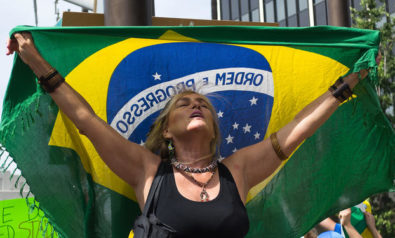Will Brazil’s climbing economy tumble?
Background
Brazil is an emerging international power. The World Bank recognizes it as one of the world’s fastest growing economies, crediting Brazil’s widespread economic reforms as the driving force behind its growing global influence. However, recent protests have exposed the country’s political and economic fragility and put the future of Brazil in question.
Protests began June 6 on Avenida Paulista, a cultural and historical symbol of São Paulo, and one of the main business centers of the city. The protests were initiated by the Movimento Passe Livre (MPL), a group of students who advocate free public transit. The MPL gathered to protest the 20 cent increase in transportation fare in many major cities. However, the initial free-fare movement eventually did not revolve around the fare increase.
On June 17, approximately 250,000 protestors gathered in Brazilian cities; in Rio de Janeiro alone, more than 100,000 attended.
Police violence escalated as the protests grew, with officers reportedly having used rubber bullets, tear gas, and pepper spray to deter protestors. A handful of activists were hospitalized, and one young man was killed in Ribeirão Preto, when a frustrated driver drove through a peaceful demonstration, injuring 11 others. Civil rights groups such as Amnesty International and the Associação Nacional de Jornais condemned the harsh police response.
The demands of the protestors reflect frustration with government corruption, poor education, inefficient transportation, nonexistent infrastructure, mismanaged healthcare, and massive government spending on the World Cup, to be held in Brazil next year.
Many demands have been addressed: the planned 20 cent fare increase was cancelled in major cities; the controversial PEC-37 bill was rejected; transport taxes ended; and demands like free metro passes for full-time students and 10% of the Brazilian GDP to go towards education, are currently being considered.
Furthermore, Brazilian President Dilma Rousseff and the Brazilian Congress passed a bill investing 100 percent of future oil royalties to education and healthcare. Rousseff also proposed broad political reform, raised the penalty of corruption, proposed public health reforms, and offered an urban mobility agreement with a $25 billion investment in transportation.
Still, protests continued throughout June, albeit on a much smaller scale, and remain ongoing.
Massive government expenditures on the 2013 Confederations Cup (June 15-30) and the 2014 FIFA World Cup are being heavily criticized by the public. Brazil already spent approximately 7 billion reals ($3.13 billion) on the World Cup, and is expected to spend a total of 32 billion reals ($14.38 billion), tripling South Africa’s total in 2010. Brazil is also hosting the 2016 Summer Olympics, another event expected to cost the Brazilian government billions. Demonstrators argued that the government money spent on both tournaments is beneficial only to FIFA, as it invests in high-end stadiums rather than lasting infrastructure.
Why are the Brazilian Protests Relevant?
First, the protests are strikingly similar to those of the Arab Spring and the recent demonstrations in Turkey. Many analysts have identified common factors in the use of social media as a critical tool of communication between demonstrators and to the outside world. In Brazil, sites like Twitter and Facebook have been used to organize and promote demonstrations, as well as to connect with international journalists.
The scope of the protests makes it clear that this is not one for a specific change. The demonstrations are incredibly diverse, with groups from various political and economic backgrounds voicing frustrations to the government. This is relevant because of how quickly the protests can unravel; with no end in sight despite government cooperation, Brazil’s foundation is unstable. Some argue that Rousseff and her government acted too quickly to pacify protestors in order to avoid being overthrown. For instance, when Rousseff awarded 75 percent of oil royalties to education and another 25% to healthcare, she made an enemy of the Brazilian oil industry, with the government’s oil and gas secretary, Marco Antonia Martins, criticizing the amendment. Similarly, after Rousseff pledged an investment to improve transportation, the Brazilian real fell nearly 10 percent due to the concern of a widening deficit.
Ultimately, the protest-fuelled rush for government amendments has left many questioning whether Rousseff’s proposals are realistic in the long-term. Finally, the protests caused controversy surrounding the 2014 World Cup. It is possible FIFA will change the location of the Cup if Brazil’s protests continue, citing the safety of its players and officials – which will result in an outcry over the already-spent government expenditures.
Image: Copyright © Shutterstock. All Rights Reserved
For more than 10 years, Fair Observer has been free, fair and independent. No billionaire owns us, no advertisers control us. We are a reader-supported nonprofit. Unlike many other publications, we keep our content free for readers regardless of where they live or whether they can afford to pay. We have no paywalls and no ads.
In the post-truth era of fake news, echo chambers and filter bubbles, we publish a plurality of perspectives from around the world. Anyone can publish with us, but everyone goes through a rigorous editorial process. So, you get fact-checked, well-reasoned content instead of noise.
We publish 2,500+ voices from 90+ countries. We also conduct education and training programs on subjects ranging from digital media and journalism to writing and critical thinking. This doesn’t come cheap. Servers, editors, trainers and web developers cost money.
Please consider supporting us on a regular basis as a recurring donor or a sustaining member.
Support Fair Observer
We rely on your support for our independence, diversity and quality.
Will you support FO’s journalism?
We rely on your support for our independence, diversity and quality.




